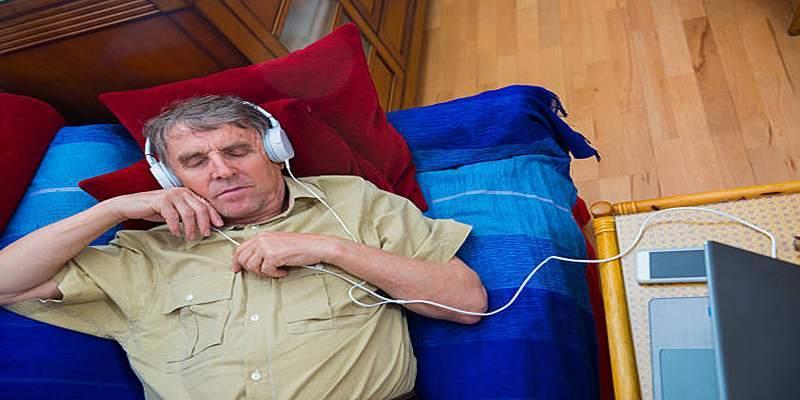Music has been linked to relaxation and improved quality of sleep for centuries, offering a natural remedy to induce rest. Here we explore the connection between music and sleep, its benefits, and some advice on how to use music for a good night's sleep.

Music also affects the brain and nervous system profoundly and can be utilized as a highly effective sleep and relaxation aid. As we listen to music, the brain receives auditory stimuli that influence the autonomic nervous system, a system responsible for heart rate and respiration.
Slow tempos and slow rhythms have the influence of slowing down heart rate, lowering breathing rate, and lowering stress hormones, inducing relaxation and sleep onset. Music also boosts dopamine, a neurotransmitter linked to positive emotions and pleasure, that soothes anxiety and creates a relaxed mind.
Tempo, rhythm, and melody are liable for music's calming effects. The tempo of 60–80 beats per minute in music is parallel to the natural resting heart rate, which brings about calmness. Slow rhythms and slow repetitive cycles create predictability, which enables the brain, as well as the body, to relax. Slow melodies with no abrupt changes provide emotional reassurance and are ideal for sleeping. Soft-toned or nature-sounding instrumental music can be especially effective for relaxation when sleeping.
Studies consistently prove that music is an effective, non-invasive sleep solution. A Journal of Advanced Nursing study found that listening to music at bedtime dramatically improved sleep quality, especially in those who experience insomnia. Classical music, in particular, reduces anxiety and promotes relaxation. Personalized music choices with an emotional connection are most effective, either through customized playlists or personal taste. The studies are clear: music is a valuable adjunct to good sleep.
Music has an extraordinary ability to connect with our minds and bodies, making it a natural remedy for improving sleep. When used mindfully, it can address common sleep challenges, such as stress and restlessness, and pave the way for peaceful nights. Below, we explore the benefits of integrating music into a sleep routine in greater detail.
Stress is a significant barrier to restful sleep, but music can actively diminish its impact. Listening to soothing tunes lowers cortisol levels, the primary hormone associated with stress, and promotes the release of relaxing hormones like dopamine. A calming playlist can also slow your heart rate and breathing, signaling your body to unwind before bedtime. Whether it’s the gentle rhythm of classical compositions or the serene tones of ambient music, incorporating these sounds can create an environment of tranquility essential for falling asleep quickly.
Music with a steady, slow rhythm, typically around 60 to 80 beats per minute, mimics the natural heart rate during rest. This connection encourages the brain to sync with these rhythms and transition into deeper sleep stages. Deep sleep is crucial for physical and mental restoration, as it enables cellular repair and memory processing. By selecting melodies that align with this tempo range, individuals may experience more rejuvenating and uninterrupted sleep. Over time, this habit can promote healthier and more consistent sleep patterns.
For those struggling with insomnia, music offers a non-invasive and cost-effective solution. Gentle and repetitive tunes provide a distraction from intrusive thoughts, guiding the mind away from anxiety that often hinders sleep. Studies show that listening to relaxing music before bed can significantly reduce the time it takes to fall asleep. This simple, low-risk intervention creates an optimal mental environment for rest and offers relief for people seeking alternatives to medications or other therapies for improving their sleep quality.
The effectiveness of music as a sleep aid increases when it resonates with personal preferences. While some may find ambient or nature-inspired sounds relaxing, others may connect better with jazz or soft vocals. Experimenting with different genres and tracks can help identify songs that work best for individual needs. Creating a regular bedtime playlist reinforces a positive sleep routine, signaling the brain that it’s time to relax. A carefully chosen playlist becomes part of a personalized strategy to improve long-term sleep health.
Using music for sleep doesn’t just impact rest itself—it has far-reaching benefits for mental well-being. Consistent quality sleep supported by calming music enhances mood, reduces symptoms of depression, and sharpens cognitive functions such as memory and focus. Over time, this improved emotional balance contributes to greater overall life satisfaction.

When it comes to selecting music to enhance sleep quality, making thoughtful choices is essential. The type of music you choose can significantly influence your relaxation levels and overall sleep experience. By considering key factors such as tempo, lyrics, and personal preferences, you can curate a playlist that effectively promotes rest and tranquility.
Lyrics in music can either aid relaxation or stimulate the mind, depending on their tone and content. Songs with complex, narrative-packed lyrics or emotionally charged themes can draw attention, keeping the mind engaged rather than relaxed. Instead, it’s often helpful to choose instrumental tracks or songs with neutral, repetitive lyrics. This reduces mental stimulation, allowing the brain to wind down more effectively.
Above all, your personal preferences should guide your music selection for sleep. What feels calming to one person might not resonate the same way for another. Experiment with different genres—classical, ambient, nature sounds, or even jazz—to find what suits you best. The emotional connection you have with certain types of music can make it uniquely relaxing and effective.
Creating a relaxing environment with the right music can greatly enhance your sleep quality. Below are some recommended genres and examples to explore:
Music is a natural, effective tool for improving sleep by reducing stress, easing insomnia, and promoting deep rest. With the right tempo, rhythm, and personal preferences, music creates a soothing environment that enhances both physical and emotional well-being. By integrating calming music into your nightly routine, you can enjoy better sleep quality and wake up feeling more refreshed and balanced.

Discover how hostels make budget travel affordable, social, and unforgettable.

Discover smart and easy ways to explore your dream destinations on a budget.

Explore top travel destinations blending culture, nature, and sustainability.

Balanced nutrition supports brain health and mood. Discover how diet affects emotional well-being and mental resilience.

Laser eye surgery guide detailing types, risks, recovery process, candidacy factors, and costs for improved vision.

Discover 10 science-backed strategies to optimise health, enhance wellness, and maintain long-term vitality naturally.

A 40-year study reveals that weight loss surgery lowers early death risk, offering long-term health and survival benefits.

Busy parents can enjoy the holidays with quick, healthy meals that save time, reduce stress, and support family wellness.

Learn the types, causes, and treatments for headaches, and discover when it’s time to consult a healthcare professional.

Is it safe to travel to Sicily after Mount Etna’s eruption? Here’s the latest safety advice, alerts, and travel tips for visitors

Bangkok, Lima, Lyon, Wellington, Osaka, and Lucknow are the top food capitals of the world that serve you the best local flavors

Get updated travel safety tips and real-time alerts for Bali tourists following the recent volcano eruption and ash disruptions